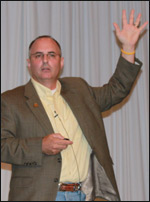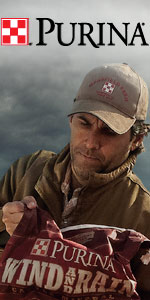International Markets are Game Changers
International markets hold promise, but beef industry needs greater access.
ATHENS, Ga. (Sept. 6, 2011) — Geof Bednar, director of international sales with Certified Angus Beef LLC (CAB), shared insight into international markets with attendees of the 2011 National Angus Conference & Tour (NAC&T) in Athens, Ga., Sept. 6.

Geof Bednar
“Agriculture is the only thing we do today that has a key surplus of sales,” Bednar said. “The key is, we don’t want to do things through ways that aren’t popular.”
Bednar explained that in terms of international markets, access is our greatest challenge. Out of the top four countries to which we send exports — Mexico, Canada, Korea and Japan — three provide us only limited access. International markets can be the best way for us to change our trading range, he said, but we need the government’s help to do so, and that can be a challenge.
Beef exports have been up 39% in the first six months of 2011, Bednar noted. These numbers haven’t quite made it back to where they were in 2003 before a cow was found to be infected with bovine spongiform encephalopathy (BSE) in the United States, but they are rising.
“When we look at how long it’s taking, it’s very frustrating,” Bednar admitted. “It’s been a long road, and it goes back to access issues.”
Despite our issues since 2003, beef export value is up 40%, which Bednar said is “tremendous.” This value has been driven by a number of “drivers of success,” including the quality of beef, the world demand for taste, currency advantages and cattle inventories by competing countries, including Brazil, Australia and Argentina.
Bednar went on to focus on the Certified Angus Beef® (CAB®) brand and it’s impact on the international market as a global brand.
“Certified Angus Beef is enjoyed in 71 countries,” he said. “We are the global brand. No one else has the foothold, strength or consumer recognition.”
A problem the brand faces, however, is logo protection. While the brand is enjoyed in 71 different countries, the logo is protected in only45. In the remaining 26 countries, packers believe they are free to slap a CAB logo onto any box of meat. This poses a significant issue, because CAB does not actually own the product, only the logo.
For example, China is currently a closed market to CAB product. However, if you roam the country, you will find the logo plastered throughout, even though legally it shouldn’t be.
When the brand is compromised, the integrity of the business is threatened. The most important thing that CAB aims to do, both domestically and internationally, is protect the integrity of the brand.
As a global brand, Bednar believes CAB will need to rely on the international market to grow in the next 10-20 years.
The best international selling year for CAB peaked at 90 million pounds, with 52% of the product going to Japan. The market crashed to 33 million pounds following the 2003 BSE scare, but it has risen back to 81 million pounds in 2010. Bednar is confident that the number will continue to rise.
“We think that we are going to hit an all-time record at the end of 2011 at about 92.8 million pounds,” he predicted.
Of course, as with any other product, the beef industry faces its share of market challenges. Economies, competition (between both other protein sources and other countries), access and cost can affect the market.
Additionally, as the entire industry has discovered over the past few years, consumer perception is a key factor in determining beef’s success. A lack of focus on consumer needs, including source verification and wholesomeness of the product, as well as the general perception of the U.S. beef industry as a whole, can be detrimental.
CAB plans to meet these challenges the best way it knows how, and that is through brand positioning. As a brand, CAB aims to position the product to the consumer in a way that is different and exciting. And in this case, "the consumer" includes the chef who prepares the product as well as the person who physically consumes it.
This year, 40 guests from 12 countries came to the United States to participate in the International Roundup. Sponsored by CAB, the Roundup took chefs from CAB-partner hotels worldwide and put them on the farms and ranches, up close and personal with the source of the product and the farmers and ranchers who raised it. Through this unique form of brand positioning, CAB was able to send its partner-chefs back to their countries with an emotional bond to the product.
While CAB is the global brand today, we can't sit back and allow our influence to subside.
“Are you willing to compete? Are you willing to dominate?” Bednar questioned. “There are markets that haven’t even been considered yet.” As a brand, Bednar said he believes CAB has an opportunity to reach out to the middle-class markets of China, India, Russia and Southeast Asia.
“There are a tremendous amount of opportunities that we haven’t even began to look at,” he said.
Bednar wrapped up his discussion by saying that from an international standpoint, convincing the consumer that the product is safe and wholesome is the most important thing CAB — and the industry as a whole — can do. If we are willing to assure consumers that our product is a safe one, they will invest in it.
“International markets are a game changer!” he concluded.
Editor’s Note: This article was written by staff or under contract for Angus Productions Inc. (API). It may not be reprinted without the express permission of API. If you would like to reprint or repost this article, request permission by contacting the editor at 816-383-5200; 3201 Frederick Ave., Saint Joseph, MO 64506. API claims copyright to this web site as presented. We welcome educational venues and cattlemen to link to this site as a service to their audience.


